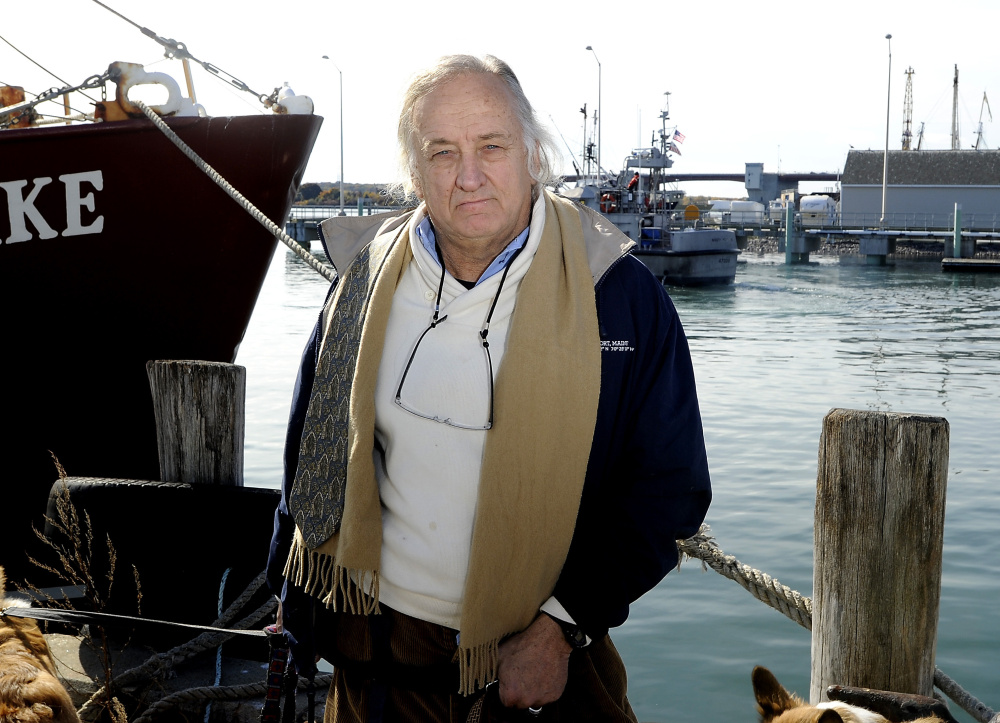Capt. Frederick John Nicoll retired from his career as a merchant mariner seven months ago after more than four decades in the business, including 17 years as a container ship captain working for Horizon Lines. Having traveled to 36 countries, including the part of the Caribbean where the El Faro cargo ship was lost earlier this month, he has assisted in the rescue of disabled vessels in the past. A Massachusetts Maritime Academy alumnus, he now lives in New Hampshire. Nicoll shares his insights into the responsibilities, dangers and tough decisions that confront those who captain container ships.
Q: What interested you in being a merchant mariner?
A: My father was, my uncle was, my godfather was, my grandfather was. We came from Nova Scotia, the family. You make your living off of the sea one way or another. It’s like the Canadian version of Norway, you know, a lot of people going away to sea.
Q: Describe the responsibilities of a cargo ship’s captain.
A: Your main concern is personnel, then vessel, then cargo. And when those (priorities) get interchanged, when A becomes B, and C becomes A, or whatever, that’s when you have problems. You don’t get to choose your crew. You only have a crew of 26 to 32, and you don’t necessarily work with the best personnel at times, so a 700-foot ship can get very small. Sometimes you have to deal with the personalities. You’ve got to be able to coax them into different situations, get things out of them that you (otherwise) couldn’t. You have to override what the company might think sometimes, and sometimes they might dismiss you for that. You’ve got to be able to figure it out.
Q: Did the ownership ever ask you to do something that you weren’t entirely comfortable with? How did you deal with that situation?
A: The ownership itself, no. More like a little bit down the line. My supervisor, he was in charge of like six ships. So he wasn’t a captain; he was like a commodore. He had 30 years’ experience. Coast Guard and Navy – he was in both. He told me once, “Whether the ship arrives two hours or two days late, it doesn’t matter. If you arrive with damage or somebody was injured, it really matters. Everybody notices that.” The bottom line is you have to make decisions, and you can always fight it out when you get back to the dock. I know of a captain who went around a storm once, and another ship went through the storm. The other ship had minimal damage. He had no damage, but he was a day and a half late, and so the company was a little upset at him. But he erred on the side of caution, which is better than erring on the other side.
Q: What sort of decisions do ship captains have to make that would not be required of other professions?
A: Is the ship in the right condition? Are we going into the right weather? Should we slow down? Should we stay away from this storm, even though another storm is coming? Maybe that’s less of a storm. Sometimes you’re hopscotching different lows and fronts.
Q: Your ship, the Horizon Trader, rescued the crew of a sailboat disabled at sea last year. When you receive a distress call, how do you decide whether to attempt a rescue or merely call the Coast Guard?
A: Immediately you try to get a hold of the Coast Guard, but you stay in contact with the ship. When I found out that we’d gone by a (disabled) boat, I said, “We’re going back to get them.” My supervisor was delighted. Some companies would be upset with that, and some wouldn’t, but the three people we saved were delighted. It was a boat going from Florida to Casco Bay. In a situation like that, you’ve got to think, “If that was me, what would I want? Am I going to call the Coast Guard and then go?” Well, first of all, once you call the Coast Guard, they may require you to stay. Whether you want to leave or not, you can’t go. And if you do leave, they’ll reprimand you and you’ll probably lose your federal license.
Q: What are the personality traits that make a good ship’s captain?
A: Being objective. Being able to weigh both sides of the story. Not showing favoritism. And most importantly, a positive attitude. A positive attitude is very important.
Q: What are the biggest dangers of the job?
A: We carry everything that goes over the road. We could have a gasoline fire, an electrical fire, and if things are really, really heated up we could have a (fire that melts the hull). But the greatest dangers are usually Mother Nature, and the ship’s ability to deal with Mother Nature … Mother Nature’s a cruel mother.
Q: What are the biggest rewards?
A: Arriving at your next port. Being able to communicate with and see your friends and your family.
Send questions/comments to the editors.




Success. Please wait for the page to reload. If the page does not reload within 5 seconds, please refresh the page.
Enter your email and password to access comments.
Hi, to comment on stories you must . This profile is in addition to your subscription and website login.
Already have a commenting profile? .
Invalid username/password.
Please check your email to confirm and complete your registration.
Only subscribers are eligible to post comments. Please subscribe or login first for digital access. Here’s why.
Use the form below to reset your password. When you've submitted your account email, we will send an email with a reset code.